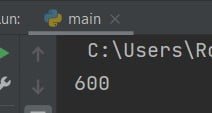Use the for loop or sum() function to make a Python program to sum all the items in a dictionary. In both methods you have to use the values() function to get the value of the dictionary.
Python program to sum all the items in a dictionary
Simple example code to find the sum of dictionary values.
Using sum() function
my_dict = {'A': 100, 'B': 200, 'C': 300}
res = sum(my_dict.values())
print(res)
Output:

Using for loop
Using For loop to iterate through values using the values() function and keep adding it to the sum.
my_dict = {'A': 100, 'B': 200, 'C': 300}
sum = 0
for i in my_dict.values():
sum = sum + i
print(sum)
Output: 600
Comment if you have any doubts or suggestions on this Python sum dictionary topic.
Note: IDE: PyCharm 2021.3.3 (Community Edition)
Windows 10
Python 3.10.1
All Python Examples are in Python 3, so Maybe its different from python 2 or upgraded versions.